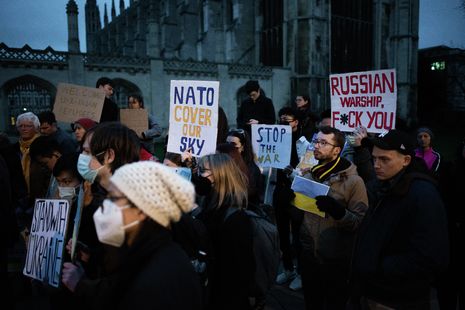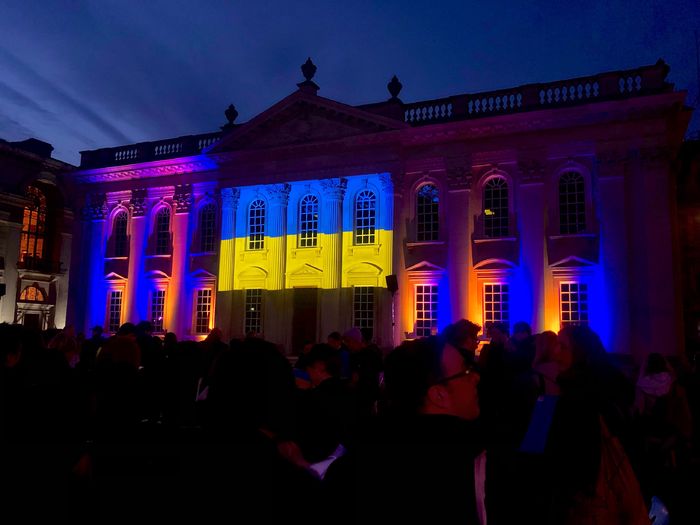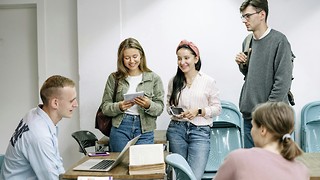‘You must return’: Year Abroad students scramble to get out of Russia
Following the Kremlin’s invasion of Ukraine, Year Abroad students are rushing – and struggling – to get out of Russia. Some have travelled by bus to Finland and Estonia. Another booked last-minute flights to Turkey

As the Kremlin wages war in Ukraine, Year Abroad students in Russia have found themselves facing difficult decisions and putting together frantic travel plans. Airspace closures have complicated many students’ planned exit routes, resulting in lengthy bus journeys and complicated third-country diversions.
After President Vladimir Putin ordered an invasion of Ukraine by the Russian army concentrated along the border last Thursday, February 24, Cambridge’s Modern and Medieval Languages and Linguistics (MMLL) Faculty encouraged students to leave Russia and offered financial support to those booking expensive emergency transport routes out of the country. Some students initially expressed a desire to stick it out, at least as long as the guidance remained advisory, but all have since, according to the MMLL Faculty, begun making urgent plans to depart.
On Monday February 28, the Foreign, Commonwealth & Development Office officially advised against all travel to Russia and urged British citizens within the country to leave. Following this shift, the MMLL Faculty similarly intensified its messaging, writing directly to those students who had initially sought to stay behind in Russia: “Now is not the time to hesitate: you must return immediately.”
“Everything has been changing incredibly fast,” one Cambridge student in Russia told Varsity. “On Thursday, I saw everything that was happening on the news, and I felt awful about the situation in Ukraine, but I didn’t necessarily think it would affect me.”
Another student, who has been studying in St Petersburg since September, told Varsity that her plans to leave Russia were littered with false-starts. At first, she and her friends booked last-minute flights out of Russia, but these were cancelled due to airspace closures. Instead, after assessing various different options, they planned to travel to nearby Helsinki, Finland, before flying back to the UK. Although they initially considered bus travel, the students ultimately decided to book a taxi, concerned that buses would be overcrowded and wouldn’t tolerate their vast quantities of luggage, accumulated over 7 months of life in Russia.
“We finally burst into tears when the plane landed in the UK”
Their taxi was scheduled for 5AM on Monday morning. At 1AM, it was unexpectedly cancelled, so the students reverted to their initial plan to take the bus which, fortunately, permitted their heavy suitcases. At the Finnish Border, they had to briefly get off the bus and travel on foot to go through Customs, dragging their suitcases through the snow. The Russian border officials there, the student tells me, “were especially confrontational”, but eventually permitted them to pass through, following five separate Visa checks.
After they reached Helsinki, the students’ journey home was relatively smooth, if emotionally draining. “We were all just running on adrenaline, but we finally burst into tears when the plane landed in the UK.” At that point, they had barely slept in three days, having had to rapidly pack up all of their possessions, make urgent exit plans, and bid their loved ones in Russia goodbye.
With airspaces closed, road travel is one of the few remaining options for those seeking to leave Russia. Natalie, who has been living in a small village to the southwest of Moscow, plans to travel by bus to Tallinn, Estonia. The journey, at more than 1,000 km, will take almost an entire day.
Speaking to Varsity earlier in the week, Natalie said: “These updates are coming in rapidly and it has been challenging trying to make a final decision, but after a long day of weighing options and speaking to various people, it looks like I will be leaving.”
“While no one here feels that it is, or will become unsafe in the village, some people who have spoken to me from back home are worried about travel from Russia and how ordinary Russians will fare in the wake of sanctions and economic isolation. A family member expressed a strong desire for me to return, and it is likely that within days I will say goodbye to the people who welcomed me into their community. I’m thankful for their hospitality and will miss them dearly.”
“I’m in action mode and I don’t have time to process or digest”
While most students have headed back to the UK, at least temporarily, William – a student in St Petersburg – plans to travel to Turkey. Falling outside of the European Union, Turkey is still accepting direct flights from Russia. Once there, William hopes to seek alternative language-learning opportunities in either Azerbaijan or Kyrgyzstan, which both have large Russian-speaking communities.
William has spent the last few days rapidly reassessing the situation and putting together contingency plans. Asked about the impact on his mental health, he said: “It’s one of those situations that’s so weird that you can’t get into any anxious state. I’m in action mode and I don’t have time to process or digest.”
Asked about the Faculty’s support for Year Abroad students in Russia, Prof Geoffrey Kantaris, Co-Chair of MMLL, told Varsity: “We wrote to students on February 12 to ascertain their safety, urging caution and that they should follow FCO guidance closely.
“On the day of the invasion, and in subsequent days, we have been in constant contact with students. We provided full details of the financial support available to them from the University Travel Insurance, the Insurance risk management company, and from Faculty funds, to enable all students to return home early and seek a placement or other activity elsewhere.
“As of February 28, the FCO has changed its travel advice for Russia. It is now advising against all travel to the Russian Federation. We have accordingly been in contact with the few remaining students informing them that they are now required by the University to return home. We can no longer guarantee their personal safety if they remain in Russia. We understand that all students are now making arrangements to leave. We will continue to provide support to all of our students to the best of our ability, whatever their current location or situation.”
 Features / Beyond the porters’ lodge: is life better outside college?24 February 2026
Features / Beyond the porters’ lodge: is life better outside college?24 February 2026 Theatre / Footlights Spring Revue? Don’t Mind if I Do!25 February 2026
Theatre / Footlights Spring Revue? Don’t Mind if I Do!25 February 2026 News / Cambridge academics sign open letter criticising research funding changes22 February 2026
News / Cambridge academics sign open letter criticising research funding changes22 February 2026 Fashion / The evolution of the academic gown24 February 2026
Fashion / The evolution of the academic gown24 February 2026 News / Student and union protesters hold ‘Trans Liberation Solidarity Rally’ 24 February 2026
News / Student and union protesters hold ‘Trans Liberation Solidarity Rally’ 24 February 2026








![How to Create an Attractive Freelancer Portfolio [5 Tips & Examples]](https://www.varsity.co.uk/images/dyn/ecms/320/180/2026/02/vitaly-gariev-ho2tNOWZYXM-unsplash-scaled.jpg)


